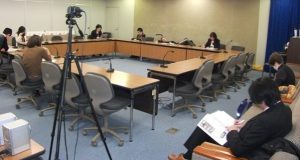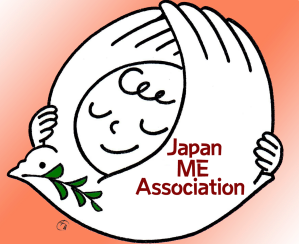 Japan ME Association held a press conference at the Ministry of Health, Labour and Welfare’s press club on December 14, 2017 to announce our opposition to the public draft of proposed “Treatment Guidelines for ME/CFS for Japan,” issued by the Research Committee for the Development of Treatments and Treatment Guidelines for ME/CFS for public comment. The proposed clinical treatment guidelines for ME/CFS are scheduled to be published in spring 2018 in Nihon Iji Shimpou, one of the most widely read medical journals in Japan. JMEA received a request to submit an external review in November 2017, and we announced our opposition to the proposed guidelines at the press conference. NHK, The Asahi Shimbun, The Sankei Shimbun, Kyodo News, and several regional media outlets attended.
Japan ME Association held a press conference at the Ministry of Health, Labour and Welfare’s press club on December 14, 2017 to announce our opposition to the public draft of proposed “Treatment Guidelines for ME/CFS for Japan,” issued by the Research Committee for the Development of Treatments and Treatment Guidelines for ME/CFS for public comment. The proposed clinical treatment guidelines for ME/CFS are scheduled to be published in spring 2018 in Nihon Iji Shimpou, one of the most widely read medical journals in Japan. JMEA received a request to submit an external review in November 2017, and we announced our opposition to the proposed guidelines at the press conference. NHK, The Asahi Shimbun, The Sankei Shimbun, Kyodo News, and several regional media outlets attended.
JMEA believes that the proposed treatment guidelines do not provide an adequate, reliable, or safe basis for clinicians in Japan to make treatment decisions for ME/CFS patients in real-life clinical settings. The research committee evaluated various treatments to create the proposed treatment guidelines solely on the basis of a literature review (using an “Evidence-Based Medicine” analysis), with each treatment given an effectiveness grade of an ‘A’ to ‘I’ grade-rating (with an A-grade being the most effective).
The result is a document that merely discusses the results of the committee’s literature review, with no A-grade treatments and with a single B-grade treatment recommendation for Graded Exercise Therapy (GET) (all other treatments mentioned in the guideline document — CBT, antidepressants and other drug treatments, Chinese herbal medicines, and yoga — were rated C-grade or lower), with no discussion or guidance on how to distinguish among the appropriateness of the various treatments for actual ME/CFS patients, each with varying symptoms and severity of illness.
Further, the proposed treatment guidelines pose a risk to worsening the symptoms and overall health of ME/CFS patients in recommending Graded Exercise Therapy (GET) as the single treatment with the highest B-grade rating. In particular, gradually increasing aerobic exercise until the patient can return to their normal lives is recommended. (The guidelines recommend GET under the guidance of an appropriate instructor. However, as the document acknowledges apart from its recommendation, primary care doctors, rehabilitation specialists, and physical therapists in Japan do not have knowledge or training about ME/CFS or its symptoms.)
We believe that there is a serious problem where GET is set be established in the national treatment guidelines for Japan as the most highly-rated treatment where GET has been under harsh scrutiny and is being re-evaluated or rejected in the rest of the world. The document acknowledges in footnotes, for example, that the United States Centers for Disease Control (CDC) recently removed GET from its ME/CFS website. Nevertheless, GET is still presented in the proposed guidelines as a highly effective ME/CFS treatment based on the result of the committee’s “evidence-based medicine” literature analysis of research studies mostly from the United States and Europe. The guidelines cite to old studies where the diagnostic criteria used to screen patients are opaque, as well as to studies published in psychology journals and to the highly criticized PACE trial in its list of references in support of its treatment recommendations.
Recent research studies have shown that increasing exercise after a certain (low) threshold leads to a worsening of symptoms, with more medical institutions finally acknowledging this reality in the West. Japan and Japanese ME/CFS patients should not remain in the dark ages on this critical development.
In addition to posing a risk of worsening symptoms – especially where there is a complete lack of knowledge among Japanese physicians, physical therapists, and exercise specialists about ME/CFS and its symptoms, including the post-exertion exacerbation of symptoms – the recommendation of GET in the treatment guidelines will inevitably (and unnecessarily) deepen prevalent and mistaken beliefs about ME/CFS that are currently held among the vast majority of Japanese medical professionals (for example, that ME/CFS is a psychological illness that can be improved by gradually increasing exercise).
JMEA opposes the proposed treatment guidelines for the simple reason that they pose a serious risk to ME/CFS patients. With only a very small handful of doctors in Japan who have experience diagnosing and treating ME/CFS, the individuals who stand to suffer most from this document are ME/CFS patients in Japan of all severities of illness, including and especially severely ill patients.
We outlined the following seven reasons for our opposition to the proposed ME/CFS treatment guidelines in our written external review submitted to the research committee:
1. With no A-grade treatment recommendation and one single B-grade recommendation, the proposed ME/CFS treatment guidelines do not provide an adequate and reliable basis for physicians to determine safe and appropriate treatments for ME/CFS patients of varying illness severity in real-life clinical settings.
2. We are seriously concerned that the mostly highly recommended treatment in the proposed treatment guidelines for Japan will be for Graded Exercise Therapy (GET), a treatment being rejected around the world, and which poses a risk of worsening, and not improving, patients’ symptoms.
3. We question whether the research committee took into account the diagnostic criteria employed in the research studies that were evaluated for the “evidence-based medicine” literature review analysis on which the development of the proposed guidelines was based.
4. We question the paper’s analysis regarding the effectiveness of antidepressants to treat ME/CFS. If the selected literature included studies where there were a mix of ME/CFS patients and patients with major depression (which can easily result from the use of old diagnostic criteria such as the Oxford criteria), there is a question about the effectiveness of antidepressants to treat ME/CFS, distinguished from its effectiveness for treating depression, including secondary depression symptoms that some ME/CFS patients experience as a result of the social, financial, and personal consequences of living with a serious disabling physical illness. Because this distinction is not explained in the document, the proposed treatment guidelines gives a misleading impression about the effectiveness of antidepressants to treat ME/CFS itself.
5. In its explanation of ME/CFS, the draft treatment guidelines omit the fact that the ME is classified as a neurological disorder in the World Health Organization’s International Classification of Diseases.
6. In its explanation of ME/CFS, the proposed treatment guidelines state that the estimated the number of ME/CFS patients in Japan is 300,000, while the most recent (2012) AMED research committee concluded that the number is 0.1% of the population (a number closer to 100,000).
7. The proposed treatment guidelines were created solely using a literature review, without considering clinical information or data.
Patients already suffer from being told that the illness is “all in their heads,” that they can be cured with a change in thinking, antidepressants, or exercise, with even close family members and friends not grasping the seriousness of the illness. Patients often do not look sick and are often viewed as being malingerers. As a patient association, we cannot permit a foreseeable situation to come about that harms patients by perpetuating and exacerbating the existing problems about how the illness is viewed, understood, and treated by medical professionals in Japan.
 Questions from the press included: “Did the Ministry of Health commission the drafting of these guidelines?” “Why do you believe guidelines were drafted which would be opposed by patient groups?” “If the treatment guidelines are published, will they actually be implemented?” “What kind of treatments are patients currently receiving?” and “What position is the Japanese Neurology Society taking?”
Questions from the press included: “Did the Ministry of Health commission the drafting of these guidelines?” “Why do you believe guidelines were drafted which would be opposed by patient groups?” “If the treatment guidelines are published, will they actually be implemented?” “What kind of treatments are patients currently receiving?” and “What position is the Japanese Neurology Society taking?”
We welcome your comments in English or Japanese on the serious issues raised by the proposed national treatment guidelines for ME/CFS. Please send them to the following email address for Japan ME Association: cfsnon@gmail.com

 We are pleased to announce that the Japanese National Diet has adopted Japan ME Association’s
We are pleased to announce that the Japanese National Diet has adopted Japan ME Association’s  Japan ME Association was honoured to receive words of recommendation for our documentary film, “Hope to these Hands: The Reality of ME/CFS,” from
Japan ME Association was honoured to receive words of recommendation for our documentary film, “Hope to these Hands: The Reality of ME/CFS,” from  Japan ME Association held a press conference at the Ministry of Health, Labour and Welfare’s press club on December 14, 2017 to announce our opposition to the public draft of proposed “Treatment Guidelines for ME/CFS for Japan,” issued by the Research Committee for the Development of Treatments and Treatment Guidelines for ME/CFS for public comment. The proposed clinical treatment guidelines for ME/CFS are scheduled to be published in spring 2018 in Nihon Iji Shimpou, one of the most widely read medical journals in Japan. JMEA received a request to submit an external review in November 2017, and we announced our opposition to the proposed guidelines at the press conference. NHK, The Asahi Shimbun, The Sankei Shimbun, Kyodo News, and several regional media outlets attended.
Japan ME Association held a press conference at the Ministry of Health, Labour and Welfare’s press club on December 14, 2017 to announce our opposition to the public draft of proposed “Treatment Guidelines for ME/CFS for Japan,” issued by the Research Committee for the Development of Treatments and Treatment Guidelines for ME/CFS for public comment. The proposed clinical treatment guidelines for ME/CFS are scheduled to be published in spring 2018 in Nihon Iji Shimpou, one of the most widely read medical journals in Japan. JMEA received a request to submit an external review in November 2017, and we announced our opposition to the proposed guidelines at the press conference. NHK, The Asahi Shimbun, The Sankei Shimbun, Kyodo News, and several regional media outlets attended. Questions from the press included: “Did the Ministry of Health commission the drafting of these guidelines?” “Why do you believe guidelines were drafted which would be opposed by patient groups?” “If the treatment guidelines are published, will they actually be implemented?” “What kind of treatments are patients currently receiving?” and “What position is the Japanese Neurology Society taking?”
Questions from the press included: “Did the Ministry of Health commission the drafting of these guidelines?” “Why do you believe guidelines were drafted which would be opposed by patient groups?” “If the treatment guidelines are published, will they actually be implemented?” “What kind of treatments are patients currently receiving?” and “What position is the Japanese Neurology Society taking?”